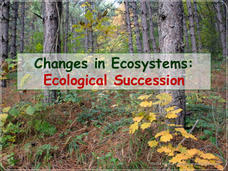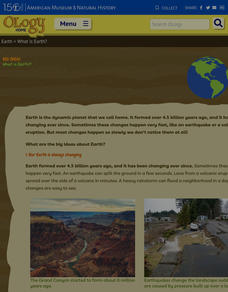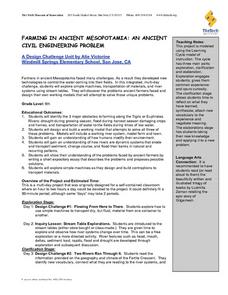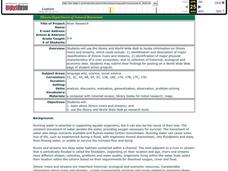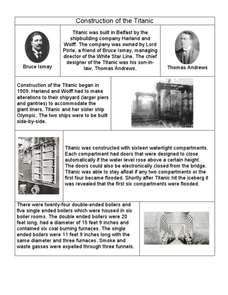NOAA
Make an Edible Coral Reef
Coral reefs are full of an abundance of life and color. Why not celebrate it with an edible coral reef? Learners and teachers alike use cake, icing, and candies to create a tasty version of a coral reef that's complete with colors,...
Big Kid Science
Create a Milk Carton Camera to Observe the Eclipse!
Step aside, fancy glasses... it's time to create a solar eclipse viewing camera of your own using nothing more than a milk carton.
Prestwick House
I Am Malala
I Am Malala: The Girl Who Stood Up for Education and Was Shot by the Taliban by Christina Lamb and Malala Yousafzai is an inspirational tale of heroism through adversity. Focus on the key details of the book with a quick review crossword...
DiscoverE
Emergency Shelter
Save yourself! Groups create a sturdy emergency shelter out of bamboo. The shelter must be large enough to fit one person. Now the most important question: Which member of the group gets to use the shelter in an emergency?
Kenan Fellows
Making Connections with Water Quality
What's in your water? And, why is water quality so important? Enhance your class's level of water appreciation through a lesson plan that demonstrates the necessity of water quality. Environmental enthusiasts explore the EPA's Clean...
Biology Junction
Origin of Life
Aristotle explained the idea of spontaneous generation, a concept which lasted almost 2,000 years before scientists proved it wrong. Scholars learn about the history of our understanding of the origins of life. They read examples of...
Biology Junction
Changes in Ecosystems: Ecological Succession
Can an area with no soil turn into a forest? Scholars learn about the process of ecological succession using an interesting presentation. It covers both primary and secondary succession in the building of new ecosystems.
Describing Egypt
Temple of Isis (Philae)
How did the Temple of Isis change throughout history? The resource discusses how architecture changed purposes over the time periods of the Pharaonic Era and the Greco-Roman Era. It gives a glimpse into what life was like and provides...
NOAA
Are You Climate Literate?: Play the Essential Principles Challenge
Installment eight of the 10-part Discover Your Changing World series tests the class's understanding of climate. Scholars play alone or in small groups to assess their understanding of climate systems, causes of climate change, and...
NOAA
Communicate!: Create a Unique Message About Climate Change
Scholars use their communication skills to express their take on climate change in the ninth installment of the 10-part Discover Your Changing World series. They create ways to deliver their messages on a specific aspect of climate by...
Stanford University
Hurricane Katrina
The adage says that journalism is the first draft of history. How should people evaluate these sources of information? Taking into account various sources, including those from various perspectives and different creators, learners...
American Museum of Natural History
Climate Change
It actually is possible to have too much of a good thing when it comes to climate change. A slide show lesson describes how burning fossil fuels contributes to climate change. Individuals read about the scientific process and the...
American Museum of Natural History
What is Earth?
Humans have only inhabited Earth for a short part of its existence. An online resource explains how scientists use clues from rocks and fossils to piece together information about Earth prior to humans. The online instruction includes...
American Museum of Natural History
What Do You Know About Virtual Water?
Did you know you can conserve water by drinking tea instead of coffee? Learn about other products that use larger amounts of virtual water in an online lesson. Pupils complete a series of questions to test their understanding of the...
NASA
Water Works on a Blue Planet
Keep within a water budget. Learners find out that less than 2.5% of Earth's water is available to drink—and that there is a fixed amount of water. Scholars read an interesting article comparing the available water to a game of Monopoly...
NASA
Write the Book on Weather Metrics
It's not easy to measure the weather. Pupils learn about what all weather has in common—the atmosphere. Scholars discover how a meteorologists must be able to measure aspects of the atmosphere and decipher the data. They then create a...
PBS
Reading Adventure Pack: Rivers
A Reading Adventure Pack showcases a fiction and nonfiction book followed by a series of hands-on activities. First, learners widdle sticks to build a tiny raft, conduct sensory experiments, and create a rap or folk song about rivers and...
Curated OER
Flying with Pythagoras
A lengthy narrative about Pythagoras and his students precedes an activity in which your young mathematicians practice using the Pythagorean theorem to solve three problems about flight and distance. Answers are provided.
Curated OER
Building on the Land
Ninth graders study how cities affect the environment and design an ecologically-sound city. They focus their study on the benefits and constraints of life on the Northern Great Plains.
Curated OER
Farming in Ancient Mesopotamia: An Ancient Civil Engineering Problem
Sixth graders identify the major obstacles in farming in Mesopotamia. They work together to design and build a model that solves these problems. They write a short essay that describes the problems and their possible solutions.
Curated OER
River Research
Students use the internet to research the streams and rivers found in Illinois. Using the information, they identify and describe the rivers and streams along with the physical characteristics of a river ecosystem. They share what they...
Curated OER
Construction of the Titanic
How was the Titanic built? Using this study guide, young historians discover details regarding the construction of the Titanic. Students read 7 sections of information and examine photographs. Consider using this handout as a jigsaw...
Curated OER
The Pronunciation of Regular Verbs in the Past Exercise
Give your class experience with pronunciation. This worksheet has learners place the given verbs ending in /-ed/ into columns based on the final sound, then state the rules for pronunciation. This is a more advanced activity and is very...
Curated OER
Rivers Quiz 3
In this rivers learning exercise, students answer short answer questions about famous rivers around the world. Students complete 10 short answer questions.








